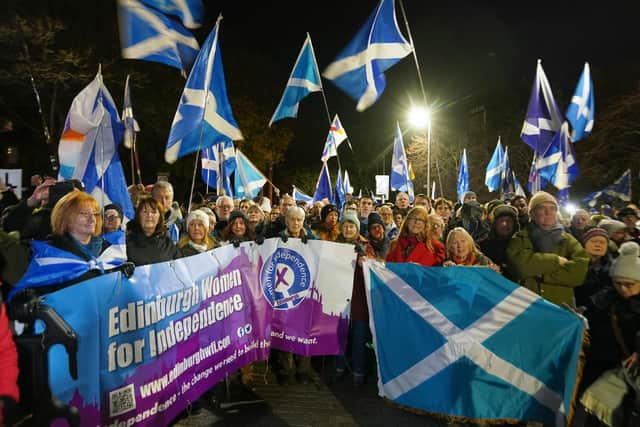Sottish independence: Prospects for 'de facto referendum' strategy don't look good – Ian Swanson
and live on Freeview channel 276
The flags, the cheers and the First Minister addressing the crowd from an outdoor stage. It could have been a scene from an election, or referendum, campaign. Hundreds of independence supporters turned up for the rally at the Scottish Parliament last week, hours after the UK Supreme Court delivered its verdict that Holyrood does not have the power to legislate for indyref2 without Westminster’s agreement.
The court's decision did not come as a surprise, but it appeared to galvanise at least the Yes campaigners who came to the rally, and has moved Nicola Sturgeon onto the next stage of her declared strategy: treating the next general election as a "de facto referendum" on independence.
Advertisement
Hide AdAdvertisement
Hide AdThat election is likely to be two years away, but there is a lot of work for the SNP and the wider independence movement to do. Some of the concerns which were key issues in the 2014 referendum – about currency, pensions and Scotland’s future relationship with Europe – are still to be answered satisfactorily for many. Other issues have arisen since then, like the border between an out-of-the-EU England and a possibly-back-in-the-EU Scotland.


Ms Sturgeon and her allies need to set out a strong case for independence and convince voters it’s the right time if they are going to win. The Scottish Government’s “Building a New Scotland” series of papers is updating the independence case, but it will take more than that to capture voters’ imaginations and secure their support.
And it has to be said the prospects of Yes campaign victory at a general election do not look great. Winning over 50 per cent of the votes at an election is very rare for any party. In the 2015 election, the SNP came very close with 49.97 per cent. And the Greens' 1.35 per cent meant there was a majority of votes for pro-independence parties. Westminster elections have the added disadvantage that there are no votes for 16 and 17-year-olds – an age group which was entitled to vote in 2014 and is more likely to favour independence.
Opponents rubbish the whole notion of declaring the general election as a de facto referendum by saying Ms Sturgeon can’t tell voters what issues to take into account when deciding where to place their X on the ballot paper, and of course they’re right. But she can make it clear that if they vote SNP they will be voting for negotiations to start for Scotland to become independent and on that basis she could claim a mandate if she were to get over 50 per cent of the votes.
Advertisement
Hide AdAdvertisement
Hide AdThe question then would be whether the UK Government would recognise that mandate. Since it hasn’t recognised the mandate secured at the Holyrood election, why should a general election be any different?
But we might well never get to that point. Labour’s poll lead across the UK gives it a better chance of winning a general election than it has had for years. If Labour looks like ousting the Tories from government, with Scottish seats potentially crucial to the outcome, many voters may prefer to use their vote to ensure that happens rather than backing an uncertain route to independence.
Comment Guidelines
National World encourages reader discussion on our stories. User feedback, insights and back-and-forth exchanges add a rich layer of context to reporting. Please review our Community Guidelines before commenting.